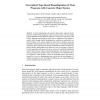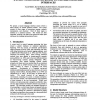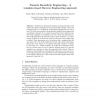113 search results - page 7 / 23 » A Karaka Based Approach to Parsing of Indian Languages |
109
click to vote
GPCE
2005
Springer
15 years 7 months ago
2005
Springer
Abstract. In meta programming with concrete object syntax, object-level programs are composed from fragments written in concrete syntax. The use of small program fragments in such ...
138
click to vote
EMNLP
2009
14 years 11 months ago
2009
We present a machine translation framework that can incorporate arbitrary features of both input and output sentences. The core of the approach is a novel decoder based on lattice...
123
Voted
ACL
1996
15 years 3 months ago
1996
We present a natural language interface system which is based entirely on trained statistical models. The system consists of three stages of processing: parsing, semantic interpre...
171
click to vote
ECMDAFA
2008
Springer
15 years 3 months ago
2008
Springer
Model driven development suggests to make models the main artifact in software development. To get executable models in most cases code generation to a "traditional" prog...
ACL
2007
15 years 3 months ago
2007
This paper introduces a Maximum Entropy dependency parser based on an efficient kbest Maximum Spanning Tree (MST) algorithm. Although recent work suggests that the edge-factored ...



